Woman Shares Problem With Boyfriend's Roommate Who Bans Her Service Dog For Narcolepsy From Entering Their Room
Service dogs are not merely pets; they are indispensable companions that provide essential support for individuals with various disabilities. These trained animals perform vital tasks, ranging from guiding the visually impaired to alerting those with medical conditions like narcolepsy before an episode occurs.
Their presence can mean the difference between safety and peril for their handlers, necessitating their constant companionship. Yet, despite their critical role, there remains a disconnect for some individuals who fail to recognize the necessity of service dogs in certain spaces, particularly in shared living situations.
This clash between necessity and acceptance is vividly illustrated in a particular account where a young woman faces opposition from her boyfriend's roommate regarding her service dog. Despite the dog's crucial role in managing her narcolepsy—a condition that can render her vulnerable in dangerous situations—the roommate has inexplicably banned the well-behaved Yorkie from their dorm.
The roommate's objection is not rooted in allergies or a general aversion to dogs but seems to stem from a misunderstanding of the dog's importance and controlling nature, as evidenced by past unreasonable demands. This stance not only disregards the medical necessity of the service dog but also adds undue stress to an environment that should be safe and welcoming.
Just take a look...
OP's boyfriend's roommate is controlling, insisting on specific sleeping arrangements for trivial reasons like watching TV.

The roommate objected to sleeping on the couch for no reason, despite late-night TV habits.

She has relied on her Yorkie service dog for three years due to narcolepsy, alerting her to dangers everywhere.

Understanding the Rights of Service Animals
Service animals play a crucial role in the lives of individuals with disabilities, including narcolepsy. According to the Americans with Disabilities Act (ADA), service dogs are recognized as essential support animals.
This legislation underscores the importance of accommodating individuals with disabilities, promoting accessibility and inclusivity.
Research shows that service animals can significantly improve the quality of life for their owners, providing emotional and physical support.
Understanding Service Animals and Their Importance
Service animals play a critical role in the lives of individuals with disabilities, providing not only physical assistance but also emotional support. As Dr. John Gray, relationship author and expert, states, "Service dogs are not just pets; they are trained companions that help individuals manage their disabilities, which can be transformative for those with conditions like narcolepsy." For more information on the rights and responsibilities surrounding service animals, you can visit Dr. Gray's website. In this instance, the boyfriend's roommate's ban on the service dog may stem from misconceptions about the role and rights of service animals. Dr. Michele Weiner-Davis, a marriage therapist, emphasizes that "Education and open dialogue can help dispel fears and foster a better understanding of the needs of those with disabilities," which is crucial for creating a supportive environment.
Roommate opposes service dog in dorm, seeing it as unnecessary despite the psychiatrist's recommendation.
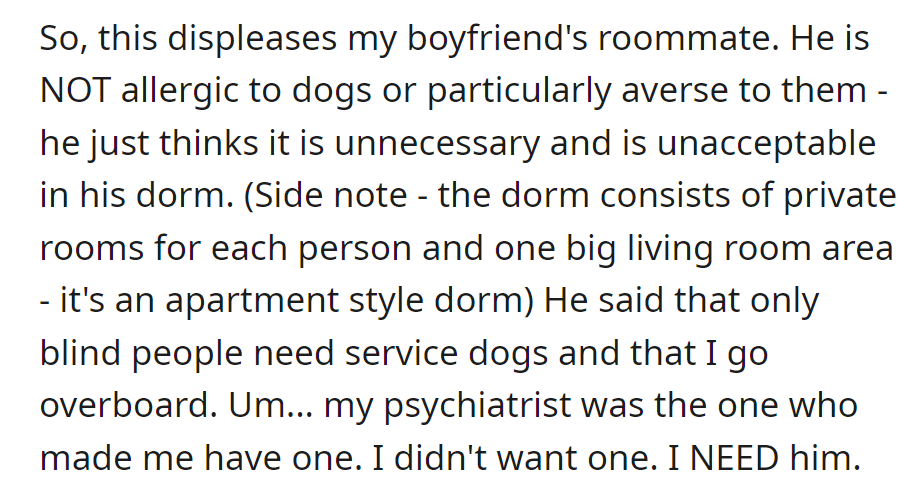
A friend objects to her dog in the dorm despite liking it, causing stress. Even after witnessing her narcolepsy episodes, he maintains his opinion.

She's facing misery in the dorm as he continuously hassles her about the dog, wondering what to do next.

From a psychological perspective, feeling rejected or unsupported by a partner in relation to their service dog can exacerbate feelings of isolation and anxiety.
Studies in clinical psychology suggest that experiences of invalidation can lead to lowered self-esteem and increased stress.
Understanding this dynamic is essential for the boyfriend’s roommate, who may not fully grasp the profound impact of his decision on the woman’s mental health.
Research highlights that emotional support and companionship from service animals can significantly improve the quality of life for individuals with chronic medical conditions. A study published in the Journal of Abnormal Psychology indicates that having a service dog can reduce feelings of anxiety and depression, making it essential that service animals are welcomed in all necessary environments.
Moreover, the stigma attached to disability can often lead to misunderstandings and social isolation for affected individuals, making advocacy for their rights even more crucial.
Here's a TLDR:
Scroll down to see what people had to say...

Time for a little RA diplomacy: Boyfriend talks, RA acts, roomie reacts.

Time to school him: If he won't listen, let the school do the talking. Nobody should lose sleep over control freaks and canines.
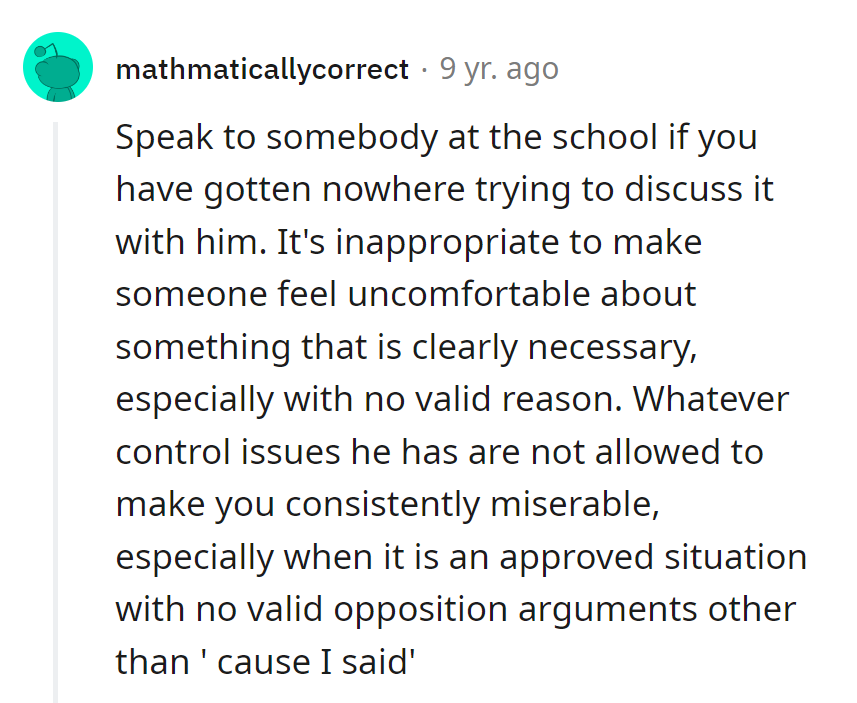
The Importance of Empathy in Relationships
Empathy is a critical component of any healthy relationship. Research published in the Journal of Personality and Social Psychology emphasizes that understanding and validating a partner's feelings can enhance relational satisfaction.
When one partner dismisses or undermines another's needs, it can create discord and hurt feelings.
Encouraging open dialogue about the roommate's concerns and the woman's needs can foster a more supportive environment.
Addressing the Roommate's Concerns
To address the roommate's ban on the service dog, it may be helpful for the woman to initiate a calm and informative discussion. Providing educational resources about the role of service animals and their legal protections can help dispel myths and alleviate fears. Open communication can lead to a better understanding and more harmonious living arrangements.
Practicing empathy during these discussions is key. Acknowledging the roommate's feelings while asserting the importance of the service dog for the woman’s well-being may create a cooperative atmosphere where all parties feel respected.
Is he the dorm's new watchdog or just barking up the wrong tree? Time for him to fetch some common sense.

Boyfriend's place for visits, roommate's for peace. Time for a reality 'paws' check on the 'no pet' policy!
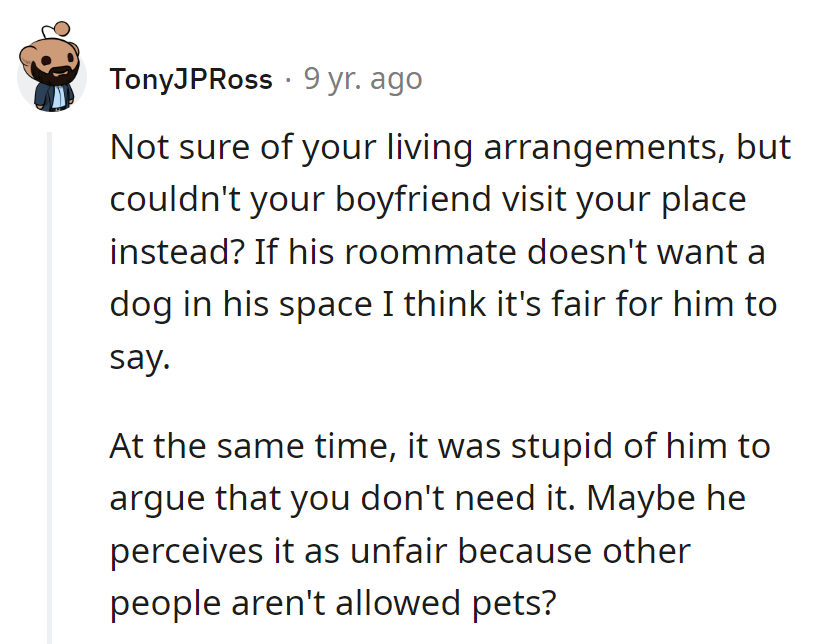
Seems like it's his apartment, his rules. But who needs friends when there's a loyal dog by her side, right?

One effective strategy could involve engaging the roommate in educational conversations about the role and importance of service dogs.
By sharing personal experiences and scientific literature on the benefits of service animals, the woman can help the roommate better understand her situation.
Such discussions can encourage compassion and reconsideration of the existing ban on the service dog.
Additionally, involving a mediator or therapist can help facilitate these conversations if tensions escalate. Conflict resolution strategies, such as active listening and negotiation, can ensure that everyone’s concerns are addressed, leading to a more supportive living environment.
Furthermore, encouraging the roommate to interact positively with the service dog in controlled situations could help alleviate any fears or misconceptions he may have, fostering a better relationship between all parties involved.
Dorm decorum: No rules against girls and boys, no room to bark about the service dog.
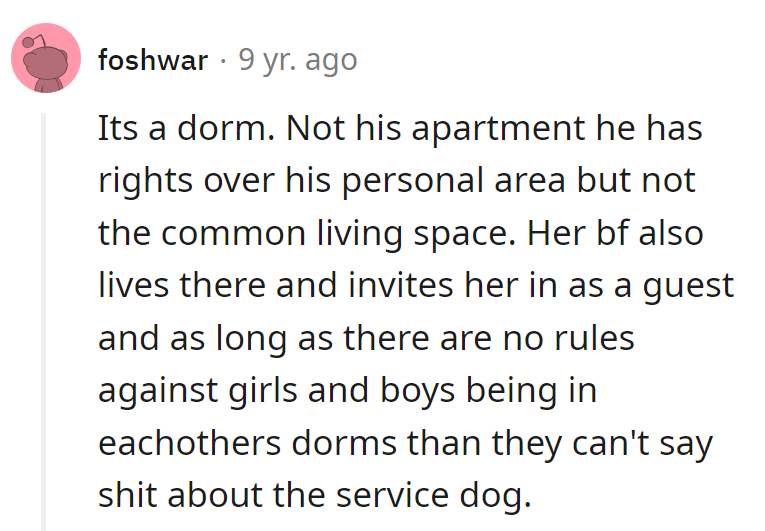
Bother her again, and she'll unleash the RA. Doggone drama, beware!

As for the type-A roommate, it's time to let the RA leash him in.

Establishing Healthy Boundaries
Setting boundaries can be a healthy way to navigate conflicts in shared living situations. The woman might consider discussing boundaries around the service dog's presence in shared spaces to ensure both parties feel comfortable.
According to studies in environmental psychology, creating designated areas can alleviate tension and promote coexistence.
Establishing clear agreements about the dog’s access to communal areas can lead to a more harmonious living arrangement.
The Importance of Advocacy for Service Animal Rights
Advocacy is essential for promoting awareness and understanding of service animal rights. Dr. Ramani Durvasula, a clinical psychologist, emphasizes that "individuals with disabilities often encounter significant barriers that affect their quality of life, including social stigma and discrimination." By advocating for their rights, individuals can help create a more inclusive society, as noted on her professional website, drramani.com. Additionally, being vocal about the importance of service dogs can empower others facing similar challenges. Dr. Sonja Lyubomirsky, a happiness researcher, states, "Sharing personal experiences and educating peers about the significance of these animals can foster empathy and support within community settings," further highlighting the importance of advocacy on her site, sonjalyubomirsky.com.
Home turf, his rules. Time to leash up elsewhere.

Time to fetch a compromise: Boyfriend's turf or elsewhere. As for the roommate, some people just don't play nice!

Sit, stay, talk: Legit need for her dog, his comments fetch trouble, and the RA's leash is ready.
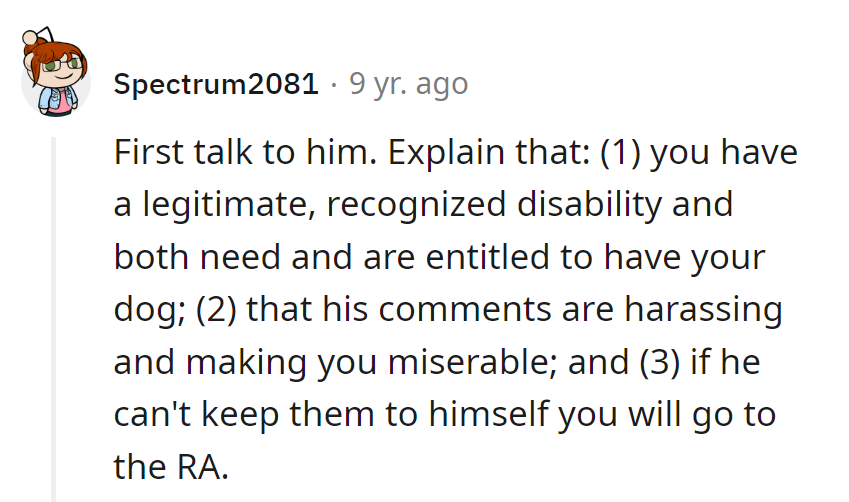
Involving a mediator, such as a mutual friend or a counselor, could be helpful in resolving this conflict. Research in conflict resolution emphasizes that neutral third parties can facilitate understanding and communication.
This approach could provide a safe space for all parties to express their concerns and work towards a mutually acceptable solution.
Having an external perspective can often illuminate misunderstandings and foster empathy.
Roommate's flunking 'Respect 101.' Maybe a crash course in 'Acceptance 101' is due!

Silence and standing ground: her secret to peace!

Crazy train alert! Keep damage control on track and ensure her BF's got her covered.

Navigating Conflict through Communication
Effective communication strategies are essential when navigating disagreements in relationships. Techniques such as active listening can help each party feel heard and respected.
Studies show that when individuals feel understood, they are more likely to engage constructively rather than defensively in discussions.
Encouraging the roommate to express his concerns while also sharing her experiences can help bridge the gap between both perspectives.
Navigating dorm life with a service dog isn't just about finding room for a pet bed—it's about challenging misconceptions one paw at a time. Perhaps the real service these dogs provide, beyond their essential duties, is teaching empathy and understanding, one stubborn roommate at a time.
Comment down your thoughts, or share this article for all your family and friends to see!
Psychological Analysis
This situation reflects common challenges faced by individuals with service animals, particularly in shared living situations. The roommate's stance may stem from a lack of understanding about the necessity of the service dog for the woman's health condition. It's essential to approach such conversations with patience and a desire to educate, as this can lead to greater acceptance and support for those with disabilities.
Analysis generated by AI
Analysis & Alternative Approaches
Ultimately, addressing the concerns surrounding service animals requires a combination of education, empathy, and advocacy. By fostering understanding and awareness, individuals can work towards more inclusive environments that respect the rights of those with disabilities. As Dr. Alexandra Solomon, a relationship therapist, states, "Understanding the needs of individuals with disabilities is essential for creating supportive relationships." Promoting awareness of service animal rights is crucial to building a supportive community, as emphasized on her website dralexandrasolomon.com.
Ultimately, fostering an environment of understanding and support can benefit all parties involved. The woman’s relationship with her boyfriend can also be strengthened through shared experiences and advocacy for her needs.
Encouraging her boyfriend to engage in conversations with the roommate can help him understand the importance of the service dog in her life.
This collaborative effort can also enhance the boyfriend's emotional connection with his partner, promoting a healthier relationship.
Psychological Analysis
This scenario highlights the importance of understanding and validating the needs of individuals with disabilities, particularly regarding service animals.
The roommate's refusal to allow the service dog reflects a lack of awareness about the essential role these animals play in the lives of their owners, which can contribute to feelings of isolation and frustration for the woman.
Analysis generated by AI
Analysis & Alternative Approaches
In summary, navigating the complexities of service animals in shared living situations requires empathy, communication, and a willingness to understand differing perspectives.
Research consistently shows that fostering supportive environments can enhance relational satisfaction and emotional well-being.
By working together and establishing clear boundaries, individuals can create harmonious living situations that honor everyone’s needs.



